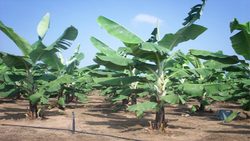Global AgInvesting | 29 July 2021
AgDevco expands in Mozambique, invests $3 million to develop banana industry
AgDevco expands in Mozambique, invests $3 million to develop banana industry
By Lynda Kiernan-Stone, Global AgInvesting Media
UK-based social impact and sub-Saharan-focused investor AgDevCo announced its latest investment of $3 million in Quinta da Bela Vista Limitada (QBV) – an irrigated banana estate in Mozambique’s Boane area.
As a specialist investor in African agriculture, AgDevCo envisions a thriving ag sector benefitting both people and planet. The firm works toward this goal by supporting agribusinesses to grow, create jobs, produce and process food, and link farmers to markets, while striving for greater climate sustainability, and possible regenerative solutions.
The firm currently has $149 million committed into 46 companies across its targeted geography, and by reinvesting its capital, AgDevCo is able to create greater impact, ensuring efficiency and change at scale.
QBV was originally established as a joint venture in 2016 between Silverstreet Capital’s Silverlands Fund I and Crookes Brothers Limited. Silverstreet is one of the largest dedicated investors in Africa’s agriculture sector with investments in eight countries across the continent, and Crookes Brothers has an impressive track record in the banana industry in South Africa – giving QBV exposure to its expertise in the sector and a marketing channel into South Africa.
Currently standing at 128 hectares (316 acres) of irrigated bananas, AgDevCo’s investment will provide QBV with long-term capital to fund the company’s strategic plan to expand to 260 hectares (642.5 acres) over the next two years.
“AgDevCo’s funding of QBV will enable the company to expand and create employment opportunities in an optimal banana growing area in southern Mozambique. They have been an ideal funding partner for QBV, structuring the loan to suit the needs of the company,” said Simon Morgan, director, QBV.
Charlotte Dubois, investment director at AgDevCo, added, “We are delighted to back QBV and partner with Crookes and Silverstreet in developing the banana industry in the Boane area, helping to build sustainable impact and bring in export revenue.”
We’re All Bananas
In Mozambique, the banana industry is a critical source of employment, with banana exports offering the country a channel through which to increase foreign exchange revenue. And that can be a good thing – humans are bananas for bananas. We love bananas so much that we sing about them – with the banana being mentioned in songs more than any other fruit.
Each person on earth eats an average of 130 bananas per year, or nearly three per week, according to data from the UN Food and Agriculture Organization, with nearly 400 million people in developing countries relying on bananas for a sizable portion of their caloric intake, creating a $44 billion global industry.
But, love alone is not enough to save the banana, at least the type of banana that we’re most familiar with, from what threatens it.
“The story of the banana is really the story of modern agriculture exemplified in a single fruit,” Daniel Bebber, head of the BananEx research group at the University of Exeter, told TIME in 2019. “It has all of the ingredients of equitability and sustainability issues, disease pressure, and climate change impact all in one. It’s a very good lesson for us.”
Since the 1950s, the Cavendish has been the banana of choice for farmers – it was resistant to the strain of Panama disease that wiped out the previously popular Gros Michel (Big Mike) variety, had impressive yields, was visually pleasing, and stayed green for long periods of time – a fortunate trait when shipping from remote locations to the world’s major markets. Today, the Cavendish accounts for nearly half of global production, but virtually all of the world’s exported bananas.
However, it wasn’t long before another strain of Panama disease, Tropical Race 4 (TR4), emerged – and this time the Cavendish wasn’t immune. Once infected, there is no course of action a plantation can take to reverse the damage.
For 30 years TR4 has been spreading at an accelerating rate, now being found in 20 countries – from Asia, to the Middle East, Australia, Africa, and Latin America (with Colombia declaring a state of emergency), prompting talk of a banana pandemic, and “the banana equivalent of Covid-19”. In response scientists are working feverishly to use genetic modification or to develop a vaccine to save the Cavendish.
But until there’s a major, scalable breakthrough, banana growers and consumers are looking at the possibility of a “new normal”. Sound familiar?













